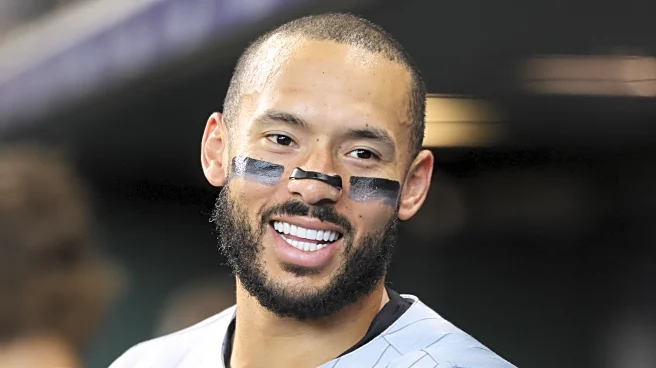One of the things that has always bothered me as analysts is that we tend to harp on the negative. I suppose that criticism sells and maybe we are predisposed to think that sort of way. While the Astros
are deep in the pennant race and everyone is on high alert, I thought it would be good to go back in time and have a little discussion about moves long since passed. It gives us a little diversion in the heat of August and it allows me to move onto something more positive.
We can certainly do the retrospective on the best deadline deals in franchise history and that probably would start and stop on Jeff Bagwell for Larry Andersen or Yordan Alvarez for Josh Fields. However, this is a different kind of retrospective. We are looking at the players that made the most immediate impact in the season when they were acquired. Obviously, much of this is dependent on the regular season performance, but a large part is also based on the playoffs. So, a look at our last player is obviously premature. However, this is probably how most people will view it. Naturally, everyone is free to add or disagree in the comments.
Carlos Beltran
Regular Season: 90 games, .258/.368/.559/.927, 23 HR, 70 Runs, 53 RBI, 28 SB
Postseason Numbers: 12 games, .435/.536/1.022/1.558, 8 HR, 21 Runs, 14 RBI, 6 SB
The bulk of Beltran’s value came in the postseason. It is hard to imagine anyone having a better postseason than him without getting to the World Series. A part of this is obviously based on the increased numbers. He was acquired earlier in the process. Others would point to the package that went the Royals way. It included John Buck, but the bigger cost was Octavio Dotel. This seems steep given the fact that Beltran only played that sseason for the Astros.
Additionally, some people would be apt to pick another player that stayed longer. If we were evaluating the overall value of the deal then the cost going the other way and what happened beyond 2004 would also matter. However, we are just talking about 2004. It probably helps that Beltran probably should already be in Cooperstown and this was arguably his best overall season when you include the playoffs.
Randy Johnson
Regular Season: 11 games, 10-1, 1.28 ERA, 84.1 INN, 116 K
Postseason: 2 games, 0-2, 1.93 ERA, 14.0 INN, 17 K
Again, critics of this pick would point to the fact that Johnson left after the season and the package that went the other way included players that ended up having solid MLB careers. Of course, the other consideration is the fact that he lost two playoff games and the team lost in the first round. I would simply argue that wins and losses are a terrible way to judge pitchers. Johnson’s job was to throw zeroes and hand it over to the bullpen late in the game. He did that in both outings. It’s not his fault the hitters weren’t able to touch Kevin Brown.
He gets this pick based on two months of dominant performance that threw the Astros over the top down the stretch. We probably shouldn’t include this, but it should be pointed out that he sold out every game in the Astrodome. Justin Verlander was a very big addition, but Johnson galvanized the fanbase more than any player the Astros have ever acquired.
Justin Verlander
Regular Season: 5 games, 5-0, 1.06 ERA, 34.0 INN, 43 K
Postseason: 6 games, 4-1, 1.96 ERA, 36.2 INN, 38 K
I’ll forgive any fan for flip flopping Johnson and Verlander. After all, the Astros did win the World Series that year and he had four of the eleven victories that postseason. I pick him behind Johnson for two reasons. First, he was acquired August 31st and not July 31st, so he had less of an impact on the pennant race. Secondly, none of those victories came in the postseason. Verlander’s lackluster record in the October classic will probably be the only major blemish on his record.
If we are considering the entire record, he probably stands with Bagwell and Alvarez for the best trade deadline additions in franchise history. The only thing those two have on him is longevity. Verlander won two Cy Young awards and two rings with the Astros. Only the ring was a major consideration in this story. We are only looking at 2017.
Carlos Correa
Regular Season: 21 games, .344/.407/.494/.901, 3 HR, 12 Runs, 12 RBI, 0 SB
Postseason: Unknown
Obviously, this is an ever developing story. However, it should be pointed out that Correa’s pace on WAR is actually superior to Beltran’s in their time as Astros in their particular season. It also is important to note that we already know that Correa is well-known clutch performer in the postseason. That is obviously putting the cart before the horse.
If we assume that Correa continues to produce as he has then he would have a legitimate argument. The only downside has been the Astros performance this month. The Astros 10-12 record is hardly a revelation since he arrived. However, he was supposedly behind the team meeting before the Baltimore Orioles series. So, we can check the leadership box too. I know this all very premature, but it is kind of fun thing to think about with the start he is off to.









